LMSC Unit 15: Recruitment and Selection Report - Everycare
VerifiedAdded on 2023/01/11
|12
|3218
|86
Report
AI Summary
This report examines the recruitment and selection processes within the context of domiciliary care settings, specifically focusing on Everycare, a UK-based home care provider. It begins by outlining the impact of legislative requirements (Equality Act, Rehabilitation of Offenders Act, Fixed Term Employees Regulations, Immigration Act, and Safeguarding Vulnerable Groups Act), regulatory requirements (employment history checks, health questionnaires, reference checks, and criminal checks), professional codes of conduct, and agreed ways of working on the recruitment and selection procedures. The report then explores circumstances necessitating specialist expertise, such as policy development, job advertisement drafting, salary determination, contract drafting, and handling criminal checks. It also analyzes how serious case reviews and inquiries have influenced policies and procedures to safeguard vulnerable adults, children, and young people. The report evaluates Everycare's current recruitment and selection methods, including job postings, application processes, and selection criteria, and concludes with recommendations for improvements to enhance the efficiency and effectiveness of the recruitment process.
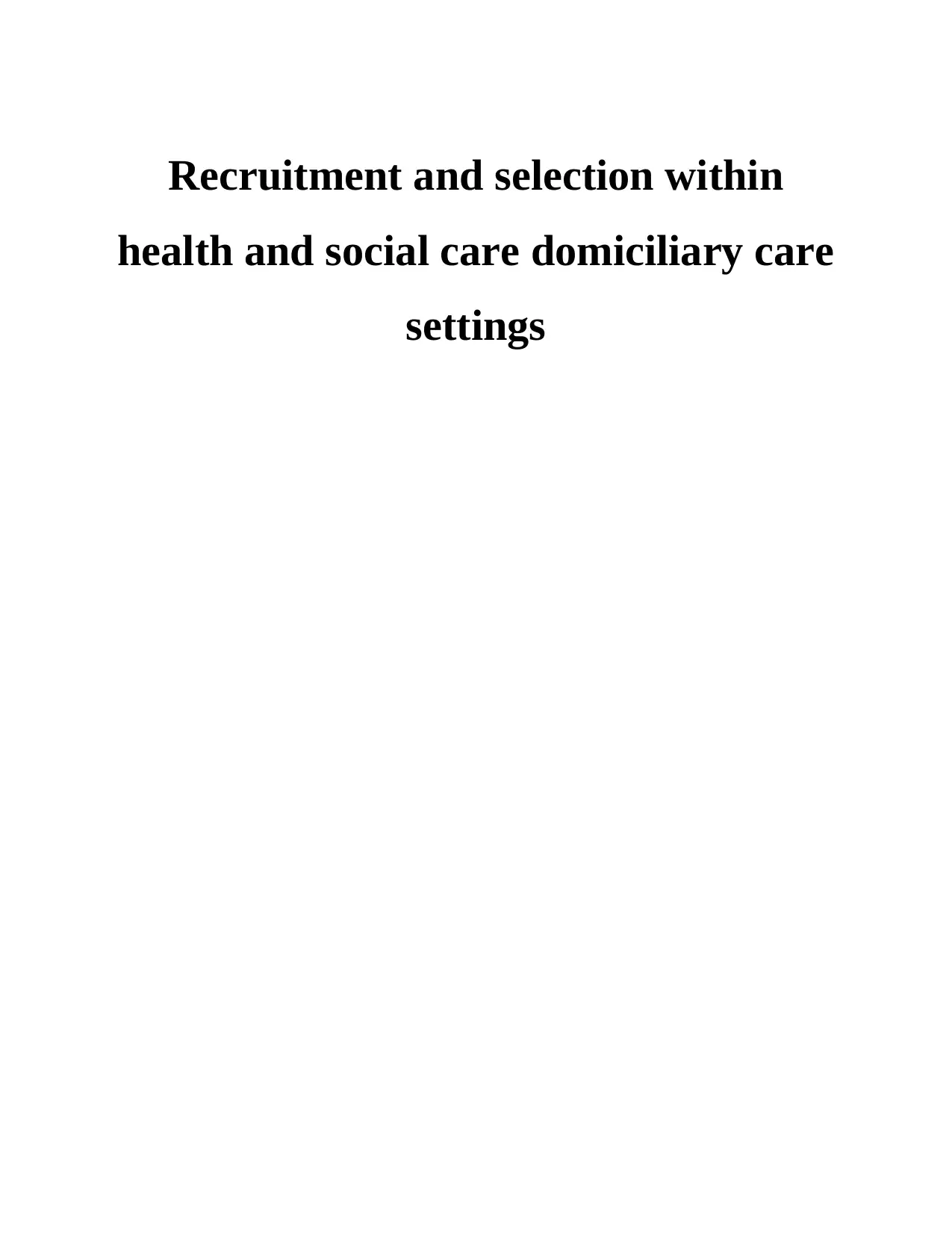
Recruitment and selection within
health and social care domiciliary care
settings
health and social care domiciliary care
settings
Paraphrase This Document
Need a fresh take? Get an instant paraphrase of this document with our AI Paraphraser
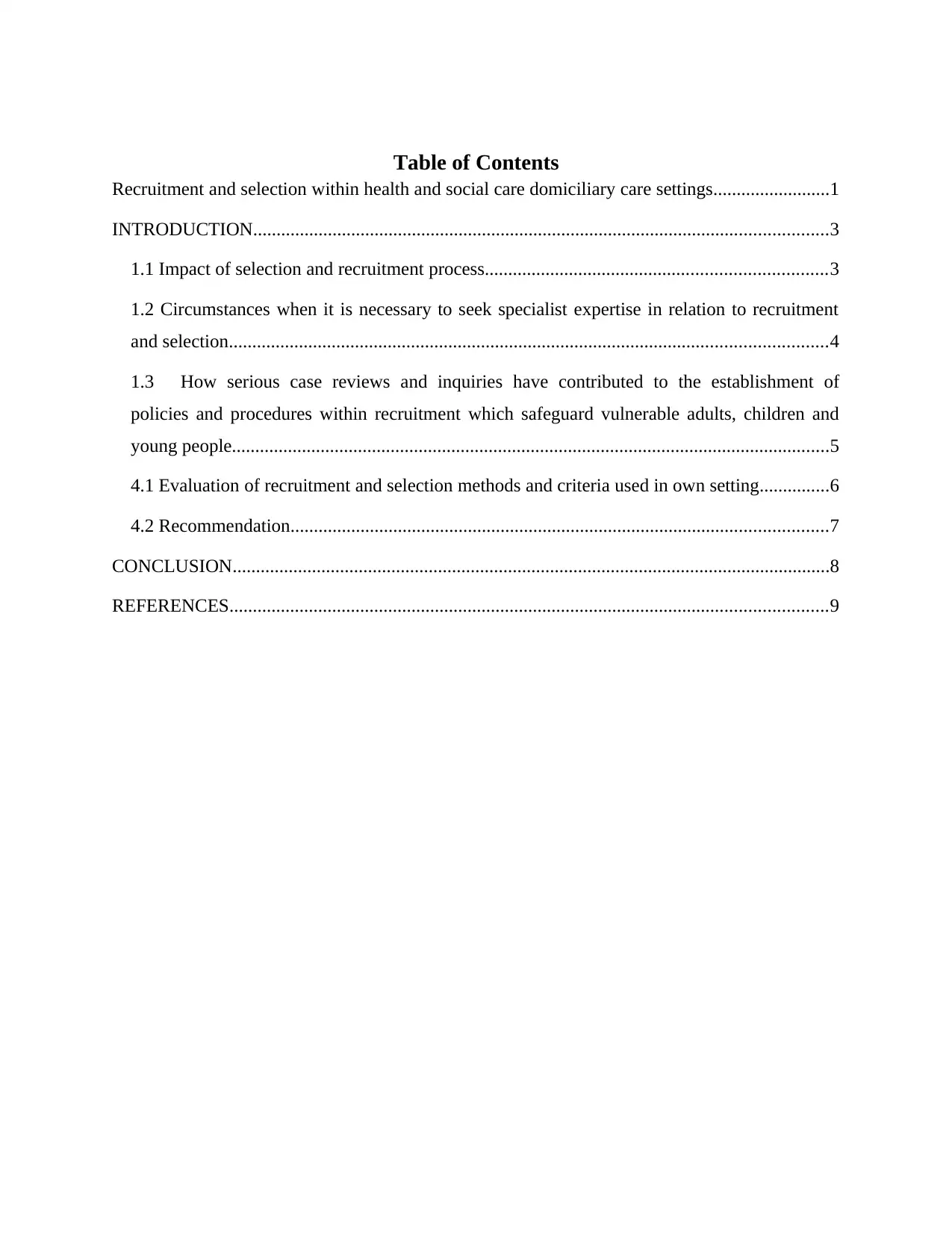
Table of Contents
Recruitment and selection within health and social care domiciliary care settings.........................1
INTRODUCTION...........................................................................................................................3
1.1 Impact of selection and recruitment process.........................................................................3
1.2 Circumstances when it is necessary to seek specialist expertise in relation to recruitment
and selection................................................................................................................................4
1.3 How serious case reviews and inquiries have contributed to the establishment of
policies and procedures within recruitment which safeguard vulnerable adults, children and
young people................................................................................................................................5
4.1 Evaluation of recruitment and selection methods and criteria used in own setting...............6
4.2 Recommendation...................................................................................................................7
CONCLUSION................................................................................................................................8
REFERENCES................................................................................................................................9
Recruitment and selection within health and social care domiciliary care settings.........................1
INTRODUCTION...........................................................................................................................3
1.1 Impact of selection and recruitment process.........................................................................3
1.2 Circumstances when it is necessary to seek specialist expertise in relation to recruitment
and selection................................................................................................................................4
1.3 How serious case reviews and inquiries have contributed to the establishment of
policies and procedures within recruitment which safeguard vulnerable adults, children and
young people................................................................................................................................5
4.1 Evaluation of recruitment and selection methods and criteria used in own setting...............6
4.2 Recommendation...................................................................................................................7
CONCLUSION................................................................................................................................8
REFERENCES................................................................................................................................9
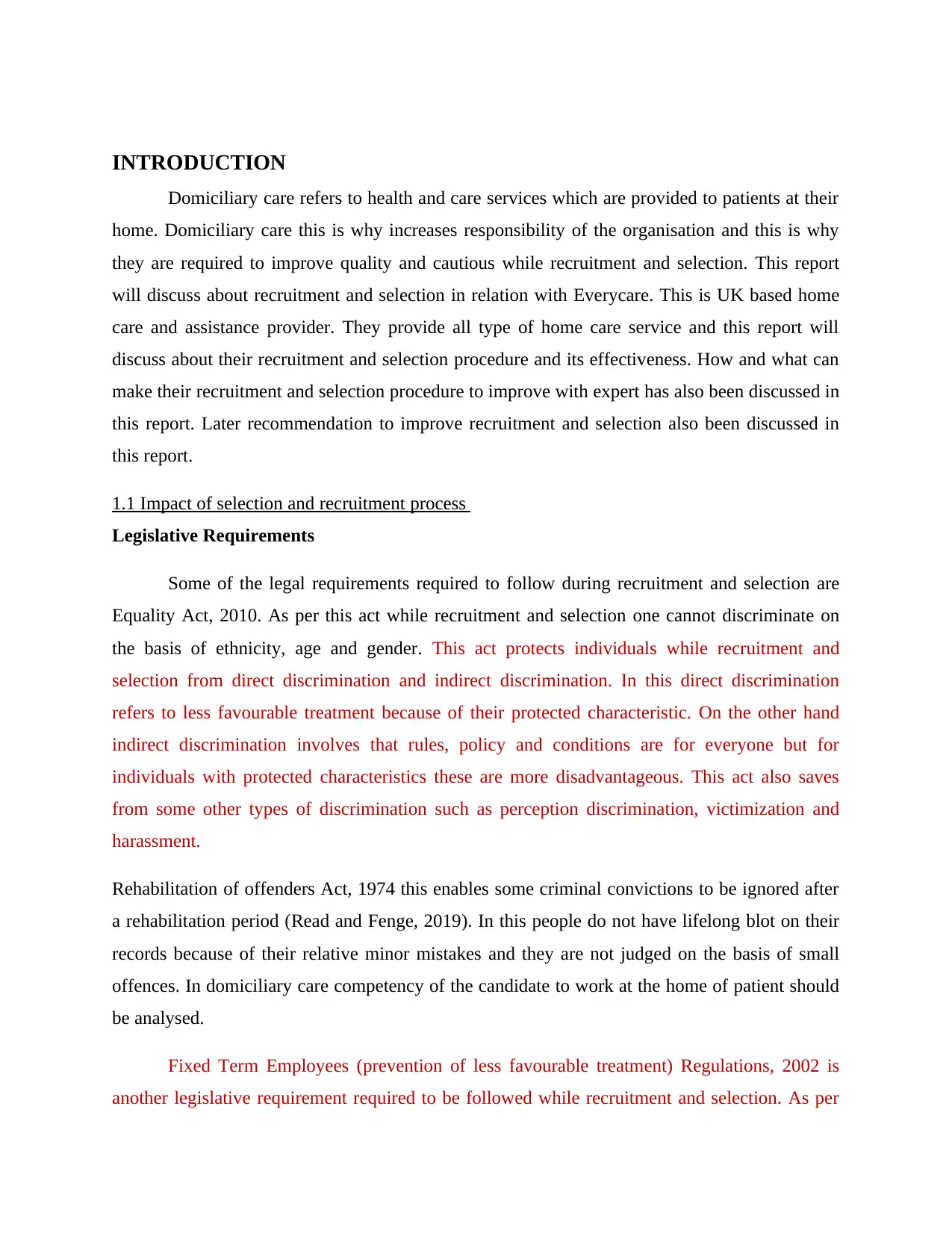
INTRODUCTION
Domiciliary care refers to health and care services which are provided to patients at their
home. Domiciliary care this is why increases responsibility of the organisation and this is why
they are required to improve quality and cautious while recruitment and selection. This report
will discuss about recruitment and selection in relation with Everycare. This is UK based home
care and assistance provider. They provide all type of home care service and this report will
discuss about their recruitment and selection procedure and its effectiveness. How and what can
make their recruitment and selection procedure to improve with expert has also been discussed in
this report. Later recommendation to improve recruitment and selection also been discussed in
this report.
1.1 Impact of selection and recruitment process
Legislative Requirements
Some of the legal requirements required to follow during recruitment and selection are
Equality Act, 2010. As per this act while recruitment and selection one cannot discriminate on
the basis of ethnicity, age and gender. This act protects individuals while recruitment and
selection from direct discrimination and indirect discrimination. In this direct discrimination
refers to less favourable treatment because of their protected characteristic. On the other hand
indirect discrimination involves that rules, policy and conditions are for everyone but for
individuals with protected characteristics these are more disadvantageous. This act also saves
from some other types of discrimination such as perception discrimination, victimization and
harassment.
Rehabilitation of offenders Act, 1974 this enables some criminal convictions to be ignored after
a rehabilitation period (Read and Fenge, 2019). In this people do not have lifelong blot on their
records because of their relative minor mistakes and they are not judged on the basis of small
offences. In domiciliary care competency of the candidate to work at the home of patient should
be analysed.
Fixed Term Employees (prevention of less favourable treatment) Regulations, 2002 is
another legislative requirement required to be followed while recruitment and selection. As per
Domiciliary care refers to health and care services which are provided to patients at their
home. Domiciliary care this is why increases responsibility of the organisation and this is why
they are required to improve quality and cautious while recruitment and selection. This report
will discuss about recruitment and selection in relation with Everycare. This is UK based home
care and assistance provider. They provide all type of home care service and this report will
discuss about their recruitment and selection procedure and its effectiveness. How and what can
make their recruitment and selection procedure to improve with expert has also been discussed in
this report. Later recommendation to improve recruitment and selection also been discussed in
this report.
1.1 Impact of selection and recruitment process
Legislative Requirements
Some of the legal requirements required to follow during recruitment and selection are
Equality Act, 2010. As per this act while recruitment and selection one cannot discriminate on
the basis of ethnicity, age and gender. This act protects individuals while recruitment and
selection from direct discrimination and indirect discrimination. In this direct discrimination
refers to less favourable treatment because of their protected characteristic. On the other hand
indirect discrimination involves that rules, policy and conditions are for everyone but for
individuals with protected characteristics these are more disadvantageous. This act also saves
from some other types of discrimination such as perception discrimination, victimization and
harassment.
Rehabilitation of offenders Act, 1974 this enables some criminal convictions to be ignored after
a rehabilitation period (Read and Fenge, 2019). In this people do not have lifelong blot on their
records because of their relative minor mistakes and they are not judged on the basis of small
offences. In domiciliary care competency of the candidate to work at the home of patient should
be analysed.
Fixed Term Employees (prevention of less favourable treatment) Regulations, 2002 is
another legislative requirement required to be followed while recruitment and selection. As per
⊘ This is a preview!⊘
Do you want full access?
Subscribe today to unlock all pages.

Trusted by 1+ million students worldwide
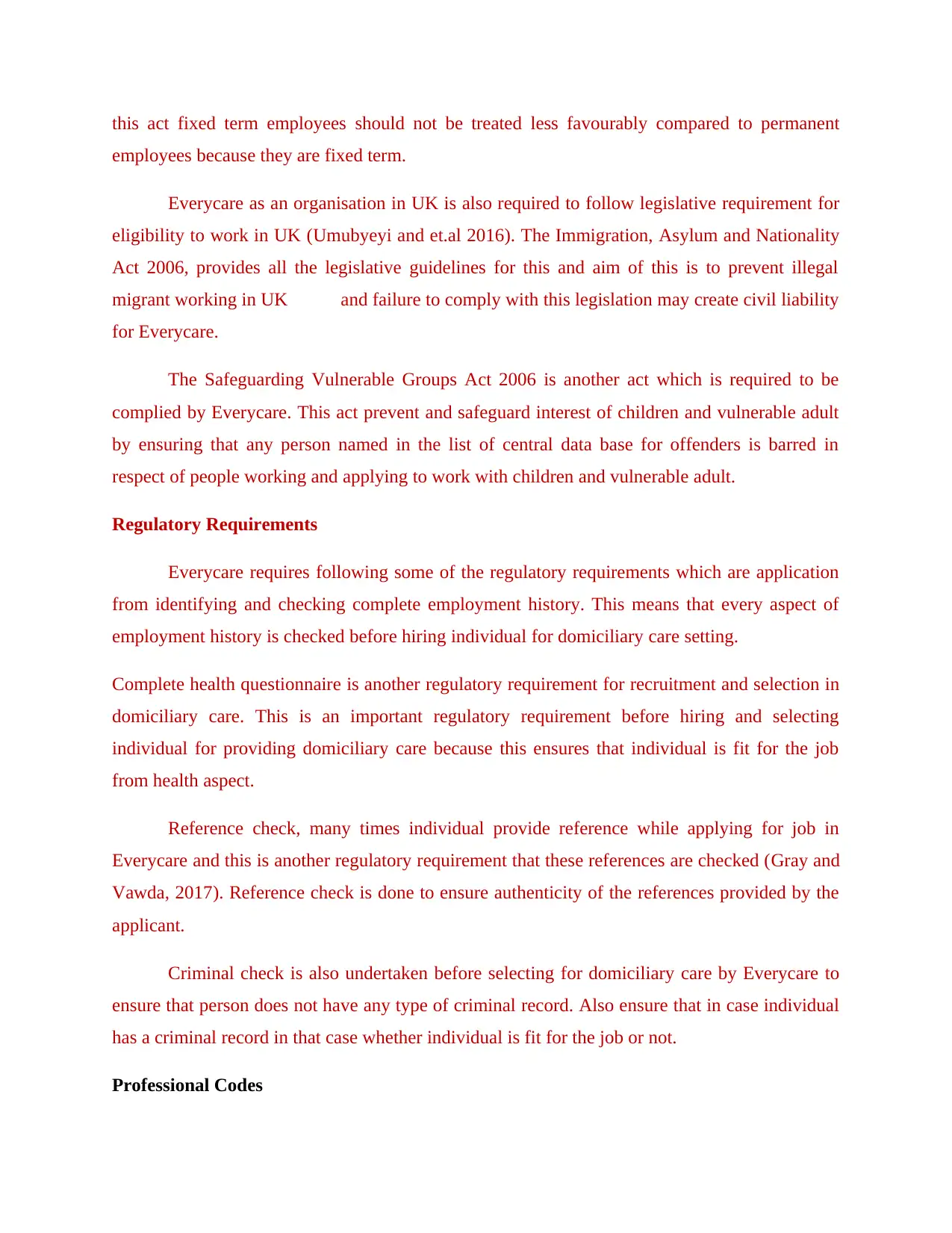
this act fixed term employees should not be treated less favourably compared to permanent
employees because they are fixed term.
Everycare as an organisation in UK is also required to follow legislative requirement for
eligibility to work in UK (Umubyeyi and et.al 2016). The Immigration, Asylum and Nationality
Act 2006, provides all the legislative guidelines for this and aim of this is to prevent illegal
migrant working in UK and failure to comply with this legislation may create civil liability
for Everycare.
The Safeguarding Vulnerable Groups Act 2006 is another act which is required to be
complied by Everycare. This act prevent and safeguard interest of children and vulnerable adult
by ensuring that any person named in the list of central data base for offenders is barred in
respect of people working and applying to work with children and vulnerable adult.
Regulatory Requirements
Everycare requires following some of the regulatory requirements which are application
from identifying and checking complete employment history. This means that every aspect of
employment history is checked before hiring individual for domiciliary care setting.
Complete health questionnaire is another regulatory requirement for recruitment and selection in
domiciliary care. This is an important regulatory requirement before hiring and selecting
individual for providing domiciliary care because this ensures that individual is fit for the job
from health aspect.
Reference check, many times individual provide reference while applying for job in
Everycare and this is another regulatory requirement that these references are checked (Gray and
Vawda, 2017). Reference check is done to ensure authenticity of the references provided by the
applicant.
Criminal check is also undertaken before selecting for domiciliary care by Everycare to
ensure that person does not have any type of criminal record. Also ensure that in case individual
has a criminal record in that case whether individual is fit for the job or not.
Professional Codes
employees because they are fixed term.
Everycare as an organisation in UK is also required to follow legislative requirement for
eligibility to work in UK (Umubyeyi and et.al 2016). The Immigration, Asylum and Nationality
Act 2006, provides all the legislative guidelines for this and aim of this is to prevent illegal
migrant working in UK and failure to comply with this legislation may create civil liability
for Everycare.
The Safeguarding Vulnerable Groups Act 2006 is another act which is required to be
complied by Everycare. This act prevent and safeguard interest of children and vulnerable adult
by ensuring that any person named in the list of central data base for offenders is barred in
respect of people working and applying to work with children and vulnerable adult.
Regulatory Requirements
Everycare requires following some of the regulatory requirements which are application
from identifying and checking complete employment history. This means that every aspect of
employment history is checked before hiring individual for domiciliary care setting.
Complete health questionnaire is another regulatory requirement for recruitment and selection in
domiciliary care. This is an important regulatory requirement before hiring and selecting
individual for providing domiciliary care because this ensures that individual is fit for the job
from health aspect.
Reference check, many times individual provide reference while applying for job in
Everycare and this is another regulatory requirement that these references are checked (Gray and
Vawda, 2017). Reference check is done to ensure authenticity of the references provided by the
applicant.
Criminal check is also undertaken before selecting for domiciliary care by Everycare to
ensure that person does not have any type of criminal record. Also ensure that in case individual
has a criminal record in that case whether individual is fit for the job or not.
Professional Codes
Paraphrase This Document
Need a fresh take? Get an instant paraphrase of this document with our AI Paraphraser
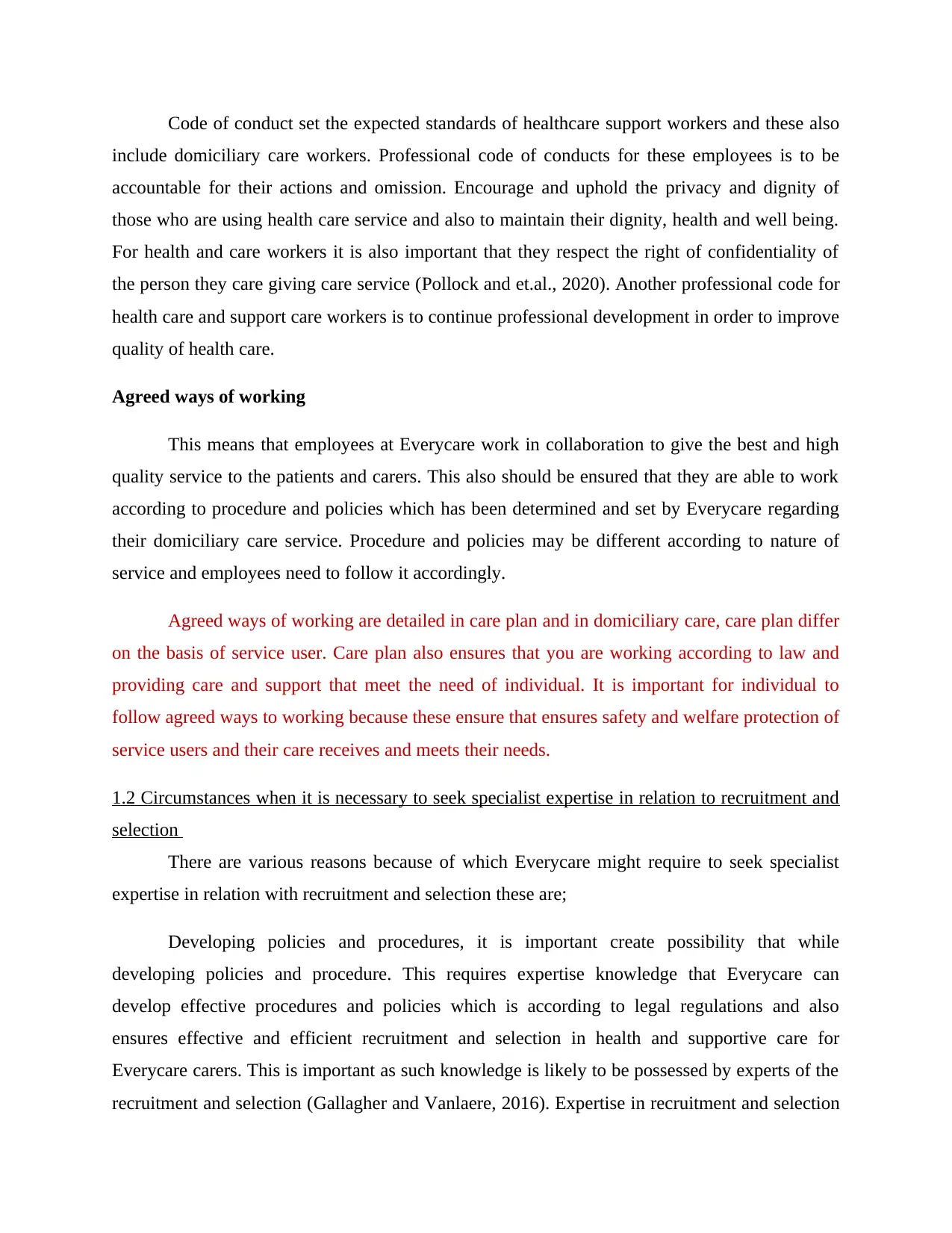
Code of conduct set the expected standards of healthcare support workers and these also
include domiciliary care workers. Professional code of conducts for these employees is to be
accountable for their actions and omission. Encourage and uphold the privacy and dignity of
those who are using health care service and also to maintain their dignity, health and well being.
For health and care workers it is also important that they respect the right of confidentiality of
the person they care giving care service (Pollock and et.al., 2020). Another professional code for
health care and support care workers is to continue professional development in order to improve
quality of health care.
Agreed ways of working
This means that employees at Everycare work in collaboration to give the best and high
quality service to the patients and carers. This also should be ensured that they are able to work
according to procedure and policies which has been determined and set by Everycare regarding
their domiciliary care service. Procedure and policies may be different according to nature of
service and employees need to follow it accordingly.
Agreed ways of working are detailed in care plan and in domiciliary care, care plan differ
on the basis of service user. Care plan also ensures that you are working according to law and
providing care and support that meet the need of individual. It is important for individual to
follow agreed ways to working because these ensure that ensures safety and welfare protection of
service users and their care receives and meets their needs.
1.2 Circumstances when it is necessary to seek specialist expertise in relation to recruitment and
selection
There are various reasons because of which Everycare might require to seek specialist
expertise in relation with recruitment and selection these are;
Developing policies and procedures, it is important create possibility that while
developing policies and procedure. This requires expertise knowledge that Everycare can
develop effective procedures and policies which is according to legal regulations and also
ensures effective and efficient recruitment and selection in health and supportive care for
Everycare carers. This is important as such knowledge is likely to be possessed by experts of the
recruitment and selection (Gallagher and Vanlaere, 2016). Expertise in recruitment and selection
include domiciliary care workers. Professional code of conducts for these employees is to be
accountable for their actions and omission. Encourage and uphold the privacy and dignity of
those who are using health care service and also to maintain their dignity, health and well being.
For health and care workers it is also important that they respect the right of confidentiality of
the person they care giving care service (Pollock and et.al., 2020). Another professional code for
health care and support care workers is to continue professional development in order to improve
quality of health care.
Agreed ways of working
This means that employees at Everycare work in collaboration to give the best and high
quality service to the patients and carers. This also should be ensured that they are able to work
according to procedure and policies which has been determined and set by Everycare regarding
their domiciliary care service. Procedure and policies may be different according to nature of
service and employees need to follow it accordingly.
Agreed ways of working are detailed in care plan and in domiciliary care, care plan differ
on the basis of service user. Care plan also ensures that you are working according to law and
providing care and support that meet the need of individual. It is important for individual to
follow agreed ways to working because these ensure that ensures safety and welfare protection of
service users and their care receives and meets their needs.
1.2 Circumstances when it is necessary to seek specialist expertise in relation to recruitment and
selection
There are various reasons because of which Everycare might require to seek specialist
expertise in relation with recruitment and selection these are;
Developing policies and procedures, it is important create possibility that while
developing policies and procedure. This requires expertise knowledge that Everycare can
develop effective procedures and policies which is according to legal regulations and also
ensures effective and efficient recruitment and selection in health and supportive care for
Everycare carers. This is important as such knowledge is likely to be possessed by experts of the
recruitment and selection (Gallagher and Vanlaere, 2016). Expertise in recruitment and selection
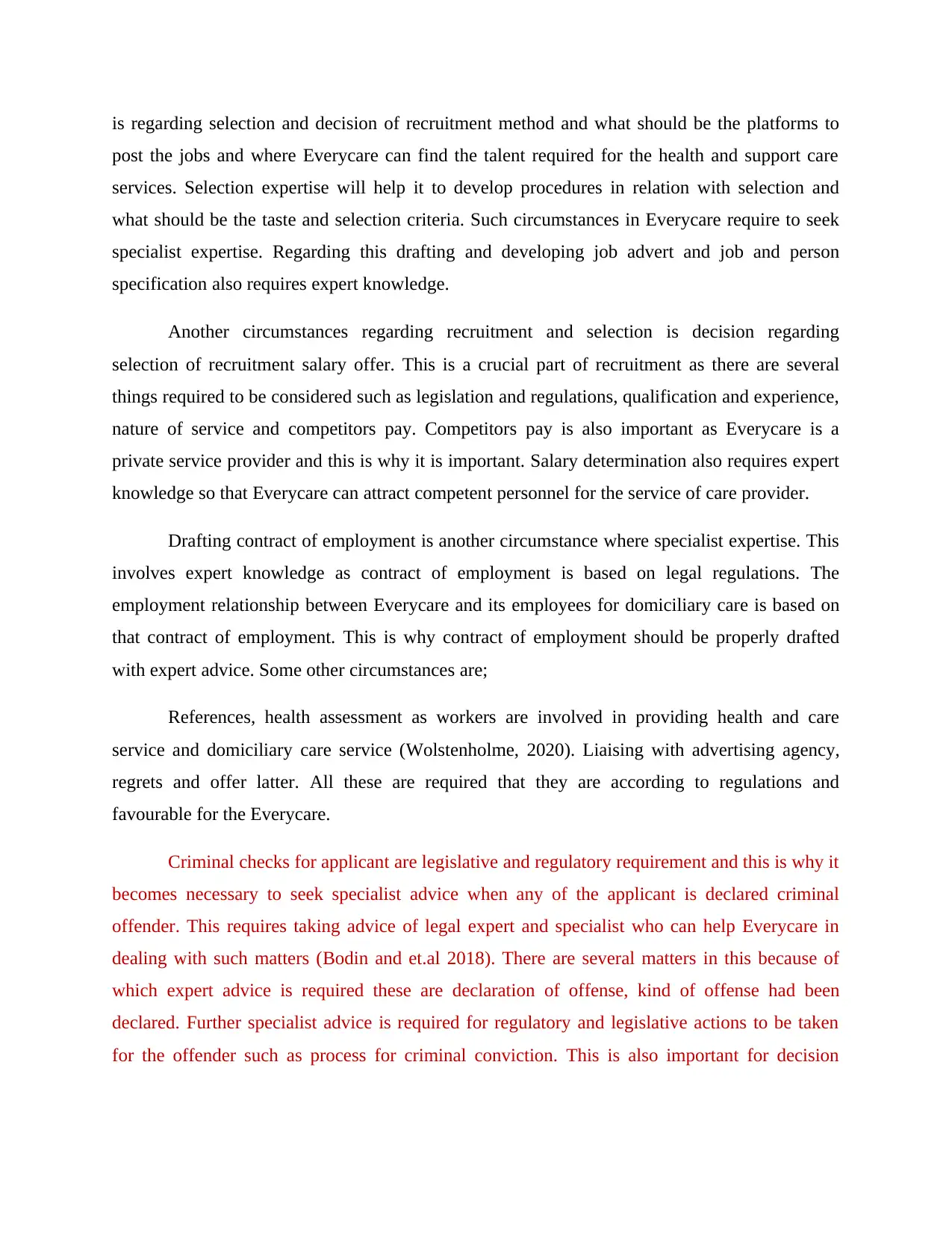
is regarding selection and decision of recruitment method and what should be the platforms to
post the jobs and where Everycare can find the talent required for the health and support care
services. Selection expertise will help it to develop procedures in relation with selection and
what should be the taste and selection criteria. Such circumstances in Everycare require to seek
specialist expertise. Regarding this drafting and developing job advert and job and person
specification also requires expert knowledge.
Another circumstances regarding recruitment and selection is decision regarding
selection of recruitment salary offer. This is a crucial part of recruitment as there are several
things required to be considered such as legislation and regulations, qualification and experience,
nature of service and competitors pay. Competitors pay is also important as Everycare is a
private service provider and this is why it is important. Salary determination also requires expert
knowledge so that Everycare can attract competent personnel for the service of care provider.
Drafting contract of employment is another circumstance where specialist expertise. This
involves expert knowledge as contract of employment is based on legal regulations. The
employment relationship between Everycare and its employees for domiciliary care is based on
that contract of employment. This is why contract of employment should be properly drafted
with expert advice. Some other circumstances are;
References, health assessment as workers are involved in providing health and care
service and domiciliary care service (Wolstenholme, 2020). Liaising with advertising agency,
regrets and offer latter. All these are required that they are according to regulations and
favourable for the Everycare.
Criminal checks for applicant are legislative and regulatory requirement and this is why it
becomes necessary to seek specialist advice when any of the applicant is declared criminal
offender. This requires taking advice of legal expert and specialist who can help Everycare in
dealing with such matters (Bodin and et.al 2018). There are several matters in this because of
which expert advice is required these are declaration of offense, kind of offense had been
declared. Further specialist advice is required for regulatory and legislative actions to be taken
for the offender such as process for criminal conviction. This is also important for decision
post the jobs and where Everycare can find the talent required for the health and support care
services. Selection expertise will help it to develop procedures in relation with selection and
what should be the taste and selection criteria. Such circumstances in Everycare require to seek
specialist expertise. Regarding this drafting and developing job advert and job and person
specification also requires expert knowledge.
Another circumstances regarding recruitment and selection is decision regarding
selection of recruitment salary offer. This is a crucial part of recruitment as there are several
things required to be considered such as legislation and regulations, qualification and experience,
nature of service and competitors pay. Competitors pay is also important as Everycare is a
private service provider and this is why it is important. Salary determination also requires expert
knowledge so that Everycare can attract competent personnel for the service of care provider.
Drafting contract of employment is another circumstance where specialist expertise. This
involves expert knowledge as contract of employment is based on legal regulations. The
employment relationship between Everycare and its employees for domiciliary care is based on
that contract of employment. This is why contract of employment should be properly drafted
with expert advice. Some other circumstances are;
References, health assessment as workers are involved in providing health and care
service and domiciliary care service (Wolstenholme, 2020). Liaising with advertising agency,
regrets and offer latter. All these are required that they are according to regulations and
favourable for the Everycare.
Criminal checks for applicant are legislative and regulatory requirement and this is why it
becomes necessary to seek specialist advice when any of the applicant is declared criminal
offender. This requires taking advice of legal expert and specialist who can help Everycare in
dealing with such matters (Bodin and et.al 2018). There are several matters in this because of
which expert advice is required these are declaration of offense, kind of offense had been
declared. Further specialist advice is required for regulatory and legislative actions to be taken
for the offender such as process for criminal conviction. This is also important for decision
⊘ This is a preview!⊘
Do you want full access?
Subscribe today to unlock all pages.

Trusted by 1+ million students worldwide
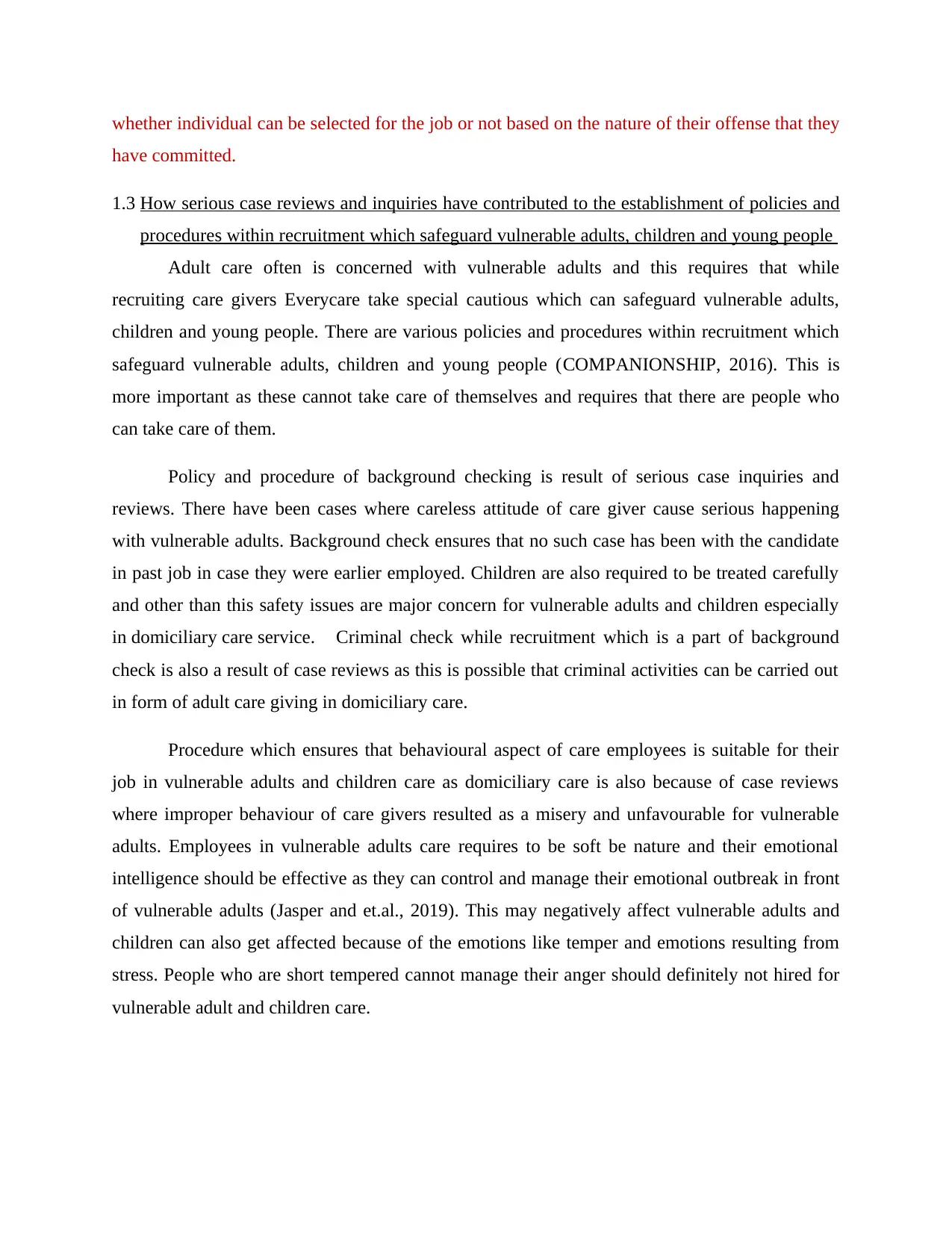
whether individual can be selected for the job or not based on the nature of their offense that they
have committed.
1.3 How serious case reviews and inquiries have contributed to the establishment of policies and
procedures within recruitment which safeguard vulnerable adults, children and young people
Adult care often is concerned with vulnerable adults and this requires that while
recruiting care givers Everycare take special cautious which can safeguard vulnerable adults,
children and young people. There are various policies and procedures within recruitment which
safeguard vulnerable adults, children and young people (COMPANIONSHIP, 2016). This is
more important as these cannot take care of themselves and requires that there are people who
can take care of them.
Policy and procedure of background checking is result of serious case inquiries and
reviews. There have been cases where careless attitude of care giver cause serious happening
with vulnerable adults. Background check ensures that no such case has been with the candidate
in past job in case they were earlier employed. Children are also required to be treated carefully
and other than this safety issues are major concern for vulnerable adults and children especially
in domiciliary care service. Criminal check while recruitment which is a part of background
check is also a result of case reviews as this is possible that criminal activities can be carried out
in form of adult care giving in domiciliary care.
Procedure which ensures that behavioural aspect of care employees is suitable for their
job in vulnerable adults and children care as domiciliary care is also because of case reviews
where improper behaviour of care givers resulted as a misery and unfavourable for vulnerable
adults. Employees in vulnerable adults care requires to be soft be nature and their emotional
intelligence should be effective as they can control and manage their emotional outbreak in front
of vulnerable adults (Jasper and et.al., 2019). This may negatively affect vulnerable adults and
children can also get affected because of the emotions like temper and emotions resulting from
stress. People who are short tempered cannot manage their anger should definitely not hired for
vulnerable adult and children care.
have committed.
1.3 How serious case reviews and inquiries have contributed to the establishment of policies and
procedures within recruitment which safeguard vulnerable adults, children and young people
Adult care often is concerned with vulnerable adults and this requires that while
recruiting care givers Everycare take special cautious which can safeguard vulnerable adults,
children and young people. There are various policies and procedures within recruitment which
safeguard vulnerable adults, children and young people (COMPANIONSHIP, 2016). This is
more important as these cannot take care of themselves and requires that there are people who
can take care of them.
Policy and procedure of background checking is result of serious case inquiries and
reviews. There have been cases where careless attitude of care giver cause serious happening
with vulnerable adults. Background check ensures that no such case has been with the candidate
in past job in case they were earlier employed. Children are also required to be treated carefully
and other than this safety issues are major concern for vulnerable adults and children especially
in domiciliary care service. Criminal check while recruitment which is a part of background
check is also a result of case reviews as this is possible that criminal activities can be carried out
in form of adult care giving in domiciliary care.
Procedure which ensures that behavioural aspect of care employees is suitable for their
job in vulnerable adults and children care as domiciliary care is also because of case reviews
where improper behaviour of care givers resulted as a misery and unfavourable for vulnerable
adults. Employees in vulnerable adults care requires to be soft be nature and their emotional
intelligence should be effective as they can control and manage their emotional outbreak in front
of vulnerable adults (Jasper and et.al., 2019). This may negatively affect vulnerable adults and
children can also get affected because of the emotions like temper and emotions resulting from
stress. People who are short tempered cannot manage their anger should definitely not hired for
vulnerable adult and children care.
Paraphrase This Document
Need a fresh take? Get an instant paraphrase of this document with our AI Paraphraser
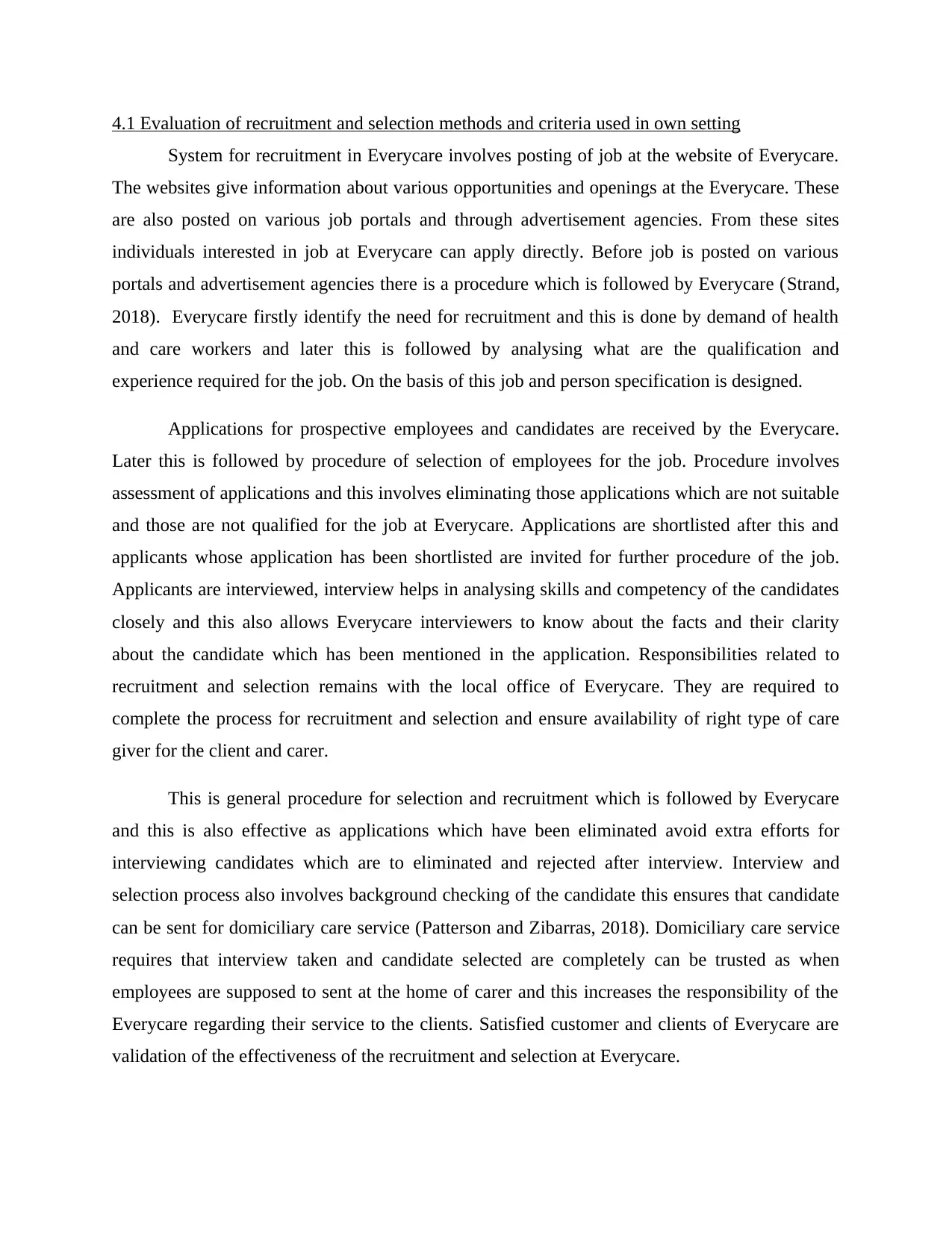
4.1 Evaluation of recruitment and selection methods and criteria used in own setting
System for recruitment in Everycare involves posting of job at the website of Everycare.
The websites give information about various opportunities and openings at the Everycare. These
are also posted on various job portals and through advertisement agencies. From these sites
individuals interested in job at Everycare can apply directly. Before job is posted on various
portals and advertisement agencies there is a procedure which is followed by Everycare (Strand,
2018). Everycare firstly identify the need for recruitment and this is done by demand of health
and care workers and later this is followed by analysing what are the qualification and
experience required for the job. On the basis of this job and person specification is designed.
Applications for prospective employees and candidates are received by the Everycare.
Later this is followed by procedure of selection of employees for the job. Procedure involves
assessment of applications and this involves eliminating those applications which are not suitable
and those are not qualified for the job at Everycare. Applications are shortlisted after this and
applicants whose application has been shortlisted are invited for further procedure of the job.
Applicants are interviewed, interview helps in analysing skills and competency of the candidates
closely and this also allows Everycare interviewers to know about the facts and their clarity
about the candidate which has been mentioned in the application. Responsibilities related to
recruitment and selection remains with the local office of Everycare. They are required to
complete the process for recruitment and selection and ensure availability of right type of care
giver for the client and carer.
This is general procedure for selection and recruitment which is followed by Everycare
and this is also effective as applications which have been eliminated avoid extra efforts for
interviewing candidates which are to eliminated and rejected after interview. Interview and
selection process also involves background checking of the candidate this ensures that candidate
can be sent for domiciliary care service (Patterson and Zibarras, 2018). Domiciliary care service
requires that interview taken and candidate selected are completely can be trusted as when
employees are supposed to sent at the home of carer and this increases the responsibility of the
Everycare regarding their service to the clients. Satisfied customer and clients of Everycare are
validation of the effectiveness of the recruitment and selection at Everycare.
System for recruitment in Everycare involves posting of job at the website of Everycare.
The websites give information about various opportunities and openings at the Everycare. These
are also posted on various job portals and through advertisement agencies. From these sites
individuals interested in job at Everycare can apply directly. Before job is posted on various
portals and advertisement agencies there is a procedure which is followed by Everycare (Strand,
2018). Everycare firstly identify the need for recruitment and this is done by demand of health
and care workers and later this is followed by analysing what are the qualification and
experience required for the job. On the basis of this job and person specification is designed.
Applications for prospective employees and candidates are received by the Everycare.
Later this is followed by procedure of selection of employees for the job. Procedure involves
assessment of applications and this involves eliminating those applications which are not suitable
and those are not qualified for the job at Everycare. Applications are shortlisted after this and
applicants whose application has been shortlisted are invited for further procedure of the job.
Applicants are interviewed, interview helps in analysing skills and competency of the candidates
closely and this also allows Everycare interviewers to know about the facts and their clarity
about the candidate which has been mentioned in the application. Responsibilities related to
recruitment and selection remains with the local office of Everycare. They are required to
complete the process for recruitment and selection and ensure availability of right type of care
giver for the client and carer.
This is general procedure for selection and recruitment which is followed by Everycare
and this is also effective as applications which have been eliminated avoid extra efforts for
interviewing candidates which are to eliminated and rejected after interview. Interview and
selection process also involves background checking of the candidate this ensures that candidate
can be sent for domiciliary care service (Patterson and Zibarras, 2018). Domiciliary care service
requires that interview taken and candidate selected are completely can be trusted as when
employees are supposed to sent at the home of carer and this increases the responsibility of the
Everycare regarding their service to the clients. Satisfied customer and clients of Everycare are
validation of the effectiveness of the recruitment and selection at Everycare.
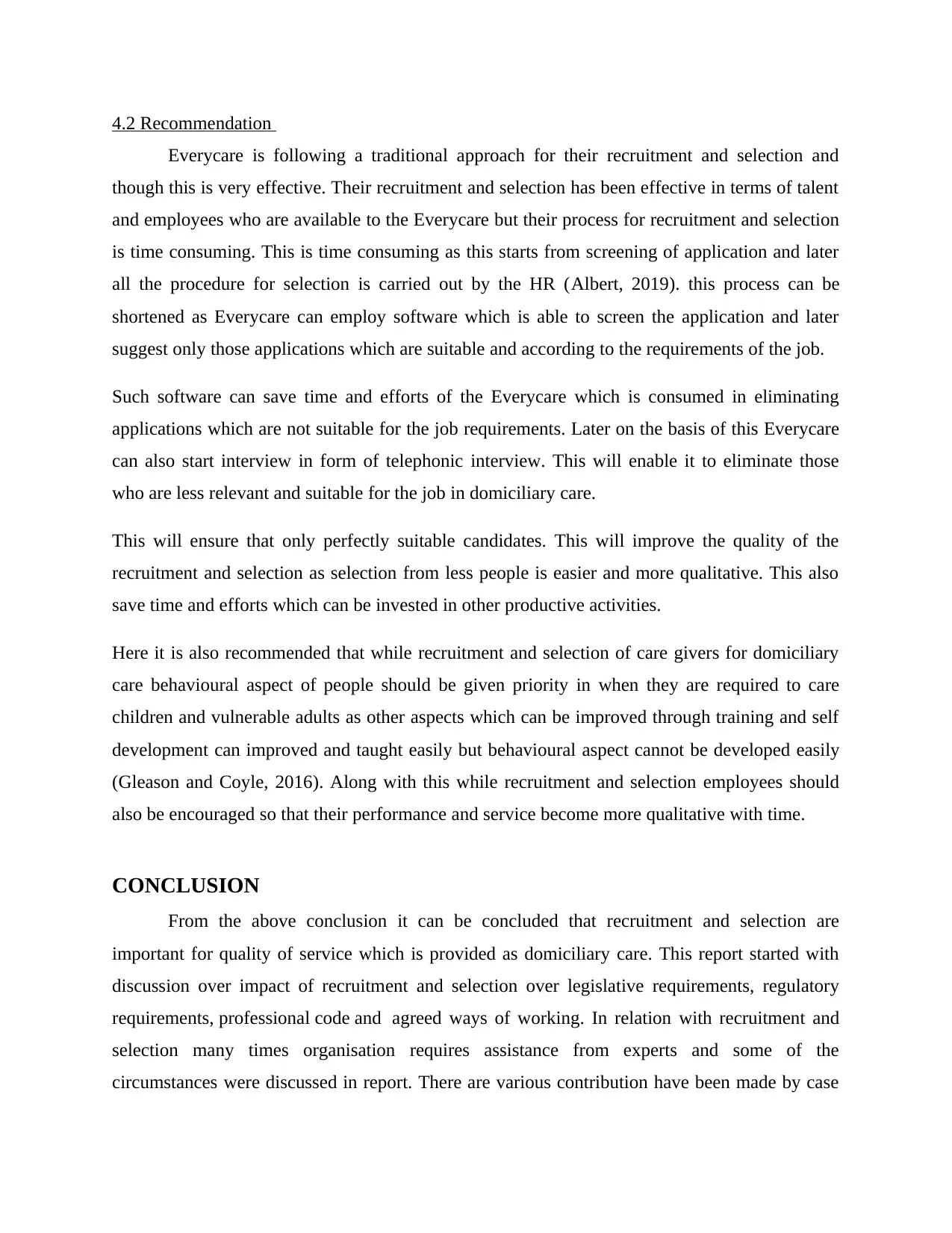
4.2 Recommendation
Everycare is following a traditional approach for their recruitment and selection and
though this is very effective. Their recruitment and selection has been effective in terms of talent
and employees who are available to the Everycare but their process for recruitment and selection
is time consuming. This is time consuming as this starts from screening of application and later
all the procedure for selection is carried out by the HR (Albert, 2019). this process can be
shortened as Everycare can employ software which is able to screen the application and later
suggest only those applications which are suitable and according to the requirements of the job.
Such software can save time and efforts of the Everycare which is consumed in eliminating
applications which are not suitable for the job requirements. Later on the basis of this Everycare
can also start interview in form of telephonic interview. This will enable it to eliminate those
who are less relevant and suitable for the job in domiciliary care.
This will ensure that only perfectly suitable candidates. This will improve the quality of the
recruitment and selection as selection from less people is easier and more qualitative. This also
save time and efforts which can be invested in other productive activities.
Here it is also recommended that while recruitment and selection of care givers for domiciliary
care behavioural aspect of people should be given priority in when they are required to care
children and vulnerable adults as other aspects which can be improved through training and self
development can improved and taught easily but behavioural aspect cannot be developed easily
(Gleason and Coyle, 2016). Along with this while recruitment and selection employees should
also be encouraged so that their performance and service become more qualitative with time.
CONCLUSION
From the above conclusion it can be concluded that recruitment and selection are
important for quality of service which is provided as domiciliary care. This report started with
discussion over impact of recruitment and selection over legislative requirements, regulatory
requirements, professional code and agreed ways of working. In relation with recruitment and
selection many times organisation requires assistance from experts and some of the
circumstances were discussed in report. There are various contribution have been made by case
Everycare is following a traditional approach for their recruitment and selection and
though this is very effective. Their recruitment and selection has been effective in terms of talent
and employees who are available to the Everycare but their process for recruitment and selection
is time consuming. This is time consuming as this starts from screening of application and later
all the procedure for selection is carried out by the HR (Albert, 2019). this process can be
shortened as Everycare can employ software which is able to screen the application and later
suggest only those applications which are suitable and according to the requirements of the job.
Such software can save time and efforts of the Everycare which is consumed in eliminating
applications which are not suitable for the job requirements. Later on the basis of this Everycare
can also start interview in form of telephonic interview. This will enable it to eliminate those
who are less relevant and suitable for the job in domiciliary care.
This will ensure that only perfectly suitable candidates. This will improve the quality of the
recruitment and selection as selection from less people is easier and more qualitative. This also
save time and efforts which can be invested in other productive activities.
Here it is also recommended that while recruitment and selection of care givers for domiciliary
care behavioural aspect of people should be given priority in when they are required to care
children and vulnerable adults as other aspects which can be improved through training and self
development can improved and taught easily but behavioural aspect cannot be developed easily
(Gleason and Coyle, 2016). Along with this while recruitment and selection employees should
also be encouraged so that their performance and service become more qualitative with time.
CONCLUSION
From the above conclusion it can be concluded that recruitment and selection are
important for quality of service which is provided as domiciliary care. This report started with
discussion over impact of recruitment and selection over legislative requirements, regulatory
requirements, professional code and agreed ways of working. In relation with recruitment and
selection many times organisation requires assistance from experts and some of the
circumstances were discussed in report. There are various contribution have been made by case
⊘ This is a preview!⊘
Do you want full access?
Subscribe today to unlock all pages.

Trusted by 1+ million students worldwide

reviews in relation with procedure for vulnerable adults, children and young people. Later
recommendations were included to improve recruitment and selection.
recommendations were included to improve recruitment and selection.
Paraphrase This Document
Need a fresh take? Get an instant paraphrase of this document with our AI Paraphraser
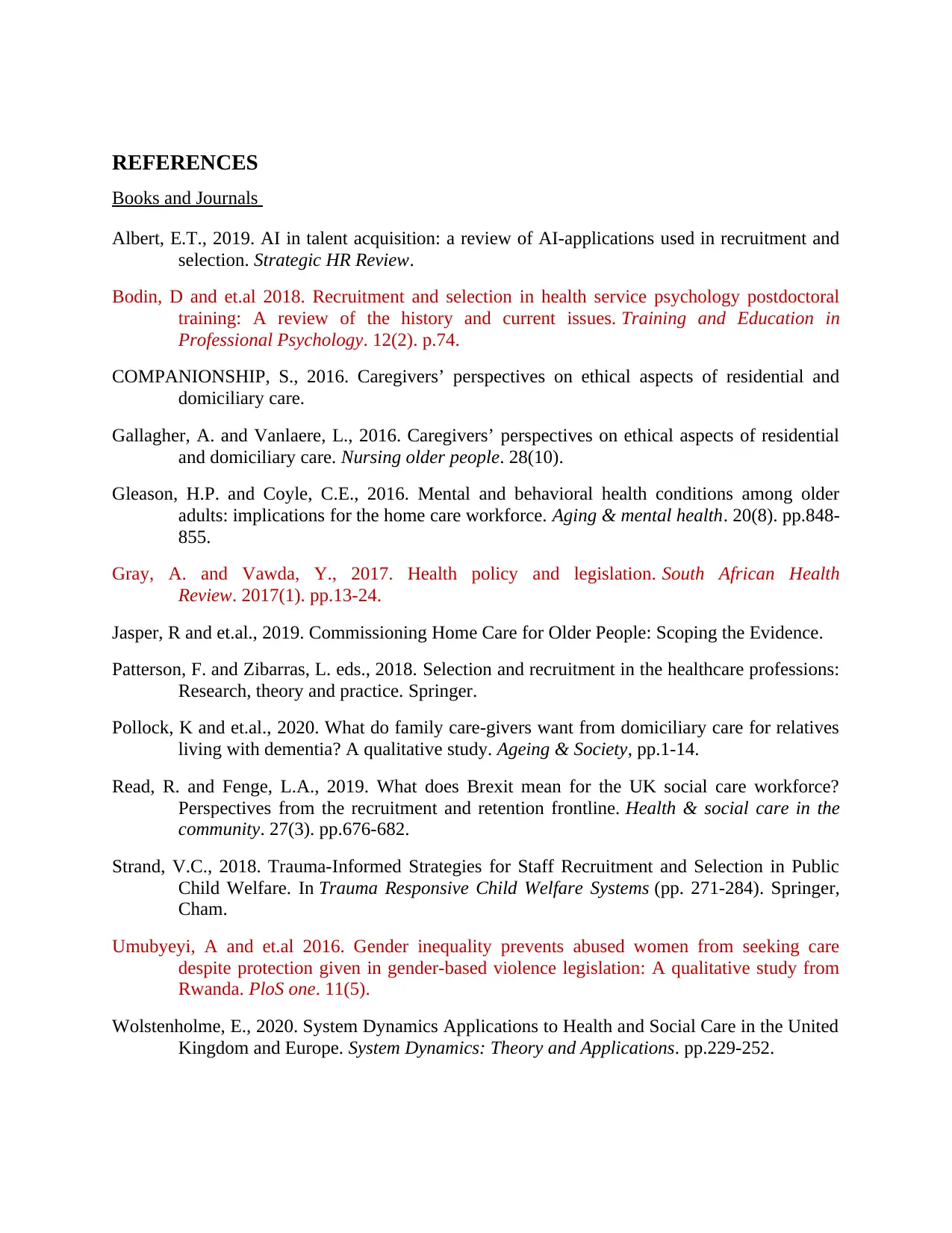
REFERENCES
Books and Journals
Albert, E.T., 2019. AI in talent acquisition: a review of AI-applications used in recruitment and
selection. Strategic HR Review.
Bodin, D and et.al 2018. Recruitment and selection in health service psychology postdoctoral
training: A review of the history and current issues. Training and Education in
Professional Psychology. 12(2). p.74.
COMPANIONSHIP, S., 2016. Caregivers’ perspectives on ethical aspects of residential and
domiciliary care.
Gallagher, A. and Vanlaere, L., 2016. Caregivers’ perspectives on ethical aspects of residential
and domiciliary care. Nursing older people. 28(10).
Gleason, H.P. and Coyle, C.E., 2016. Mental and behavioral health conditions among older
adults: implications for the home care workforce. Aging & mental health. 20(8). pp.848-
855.
Gray, A. and Vawda, Y., 2017. Health policy and legislation. South African Health
Review. 2017(1). pp.13-24.
Jasper, R and et.al., 2019. Commissioning Home Care for Older People: Scoping the Evidence.
Patterson, F. and Zibarras, L. eds., 2018. Selection and recruitment in the healthcare professions:
Research, theory and practice. Springer.
Pollock, K and et.al., 2020. What do family care-givers want from domiciliary care for relatives
living with dementia? A qualitative study. Ageing & Society, pp.1-14.
Read, R. and Fenge, L.A., 2019. What does Brexit mean for the UK social care workforce?
Perspectives from the recruitment and retention frontline. Health & social care in the
community. 27(3). pp.676-682.
Strand, V.C., 2018. Trauma-Informed Strategies for Staff Recruitment and Selection in Public
Child Welfare. In Trauma Responsive Child Welfare Systems (pp. 271-284). Springer,
Cham.
Umubyeyi, A and et.al 2016. Gender inequality prevents abused women from seeking care
despite protection given in gender-based violence legislation: A qualitative study from
Rwanda. PloS one. 11(5).
Wolstenholme, E., 2020. System Dynamics Applications to Health and Social Care in the United
Kingdom and Europe. System Dynamics: Theory and Applications. pp.229-252.
Books and Journals
Albert, E.T., 2019. AI in talent acquisition: a review of AI-applications used in recruitment and
selection. Strategic HR Review.
Bodin, D and et.al 2018. Recruitment and selection in health service psychology postdoctoral
training: A review of the history and current issues. Training and Education in
Professional Psychology. 12(2). p.74.
COMPANIONSHIP, S., 2016. Caregivers’ perspectives on ethical aspects of residential and
domiciliary care.
Gallagher, A. and Vanlaere, L., 2016. Caregivers’ perspectives on ethical aspects of residential
and domiciliary care. Nursing older people. 28(10).
Gleason, H.P. and Coyle, C.E., 2016. Mental and behavioral health conditions among older
adults: implications for the home care workforce. Aging & mental health. 20(8). pp.848-
855.
Gray, A. and Vawda, Y., 2017. Health policy and legislation. South African Health
Review. 2017(1). pp.13-24.
Jasper, R and et.al., 2019. Commissioning Home Care for Older People: Scoping the Evidence.
Patterson, F. and Zibarras, L. eds., 2018. Selection and recruitment in the healthcare professions:
Research, theory and practice. Springer.
Pollock, K and et.al., 2020. What do family care-givers want from domiciliary care for relatives
living with dementia? A qualitative study. Ageing & Society, pp.1-14.
Read, R. and Fenge, L.A., 2019. What does Brexit mean for the UK social care workforce?
Perspectives from the recruitment and retention frontline. Health & social care in the
community. 27(3). pp.676-682.
Strand, V.C., 2018. Trauma-Informed Strategies for Staff Recruitment and Selection in Public
Child Welfare. In Trauma Responsive Child Welfare Systems (pp. 271-284). Springer,
Cham.
Umubyeyi, A and et.al 2016. Gender inequality prevents abused women from seeking care
despite protection given in gender-based violence legislation: A qualitative study from
Rwanda. PloS one. 11(5).
Wolstenholme, E., 2020. System Dynamics Applications to Health and Social Care in the United
Kingdom and Europe. System Dynamics: Theory and Applications. pp.229-252.

⊘ This is a preview!⊘
Do you want full access?
Subscribe today to unlock all pages.

Trusted by 1+ million students worldwide
1 out of 12
Related Documents
Your All-in-One AI-Powered Toolkit for Academic Success.
+13062052269
info@desklib.com
Available 24*7 on WhatsApp / Email
![[object Object]](/_next/static/media/star-bottom.7253800d.svg)
Unlock your academic potential
Copyright © 2020–2025 A2Z Services. All Rights Reserved. Developed and managed by ZUCOL.





